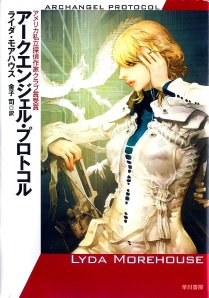The question of authors that inspire you came up on fangs, fur & fey and I thought my response might be interesting to people here.
William Gibson, and the all the various and sundry spawn of his “Movement” cyberpunk – I think everything I write is tainted by my first real sub-genre love affair. My fascination with Gibsonesque dystopias clearly imbues my gritty urban settings (because Madison, Wisconsin is the epitome of dark, urban grittiness… okay, maybe I was thinking of Other Me.) But, I think a case could be made that even in Tall, Dark and Dead, one can see the swirls of cyberpunk fingerprints smudging the edges of my worldview. There are a lot of punks in my writing – people who are a bit outside of the system. Plus, my vamps aren’t of the fluffy variety, they tend to fall on the darker side.
Katherine Kurtz – A major teen influence. I read every book of hers I could find and then spent hours writing fan fic and fantasizing that I was Alaric Morgan (among others.)
Eleanor Arnason – The first professional writer I ever met was Eleanor Arnason. I’d seen her speak at various science fiction conventions previously, but we bonded at a membership meeting for the National Writers Union over being both speculative fiction writers and writers of fiction (both rarities). She was the first person who made me think that it was possible for real people to become published authors.
Sandra Hill – The first funny romance I read was her Last Viking, a book that changed my mind about the romance genre in general.
Then in no order in particular: Fredrick Pohl, in particular, his novel Gateway. Star War the movie for me, but also the Han Solo books, particularly Han Solo’s Revenge. Ray Bradbury, George Alec Effinger, the Thieves’ World books, School House Rock, Sesame Street (especially the lovable, furry Grover), John Milton, X-Files, Marvel Comics and probably dozens of others that I’ve forgotten.
Who inspires you?



